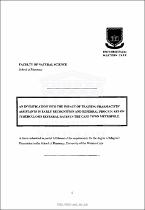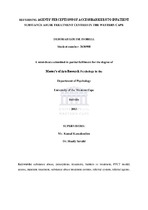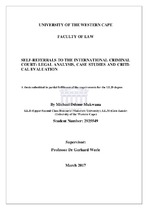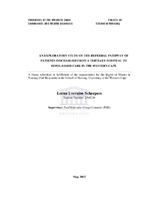An investigation into the impact of training pharmacists' assistants in early recognition and referral procedures on tuberculosis referral rates in the Cape Town metropole
Abstract
Due to the resurgence of TB globally, in 2006 the WHO and the STOP-TB partnership launched a Global plan to STOP TB. This is a l0 year plan which aims to save l4 million lives between 2006 and 2015. Specific targets were set which aims to halt and begin to reverse the incidence of TB by 2015. The targets were to detect at least 70o/o of new sputum smear-positive TB cases and to cure at least 85% of these cases by 2005, and to reduce TB prevalence and death rates by 50o/o relative to 1990 by 2015 and to thus eliminate TB as a public health problem (l case per million population) by 2050 (WHO, 2006). Most individuals tend to approach a pharmacy to obtain information, advice or medication as it is easily accessible. The purpose of this study was to train Pharmacists' assistants' in TB symptom recognition and referral procedures and to measure its effect on referral rates.
Methods: A convenience sample of (n-28) Phamacists' assistants (PA) from community pharmacies in the Cape Town Metropole region was selected to participate in the study. For the purpose of this study PAs were trained on referral procedures when recognising TB symptoms, the use of referral cards and the TB suspect register and appropriate referral to TB clinics for sputum tests. Pre-test and post1-test questionnaires covered the relevant questions pertaining to knowledge of TB and recognition of TB symptoms. The PAs were re-assessed using a post2-test questionnaire 4 months after the training to determine whether the knowledge gained in the training session was sustained. Part2 of the methodology was a supplementary sample of 3 pharmacies in which the PAs (n=12) were trained using a summarized but more intensive training method, which focused on the key aspects of the TB training to determine if the outcomes would be the same. Both samples reflected a decline in participants for the post2-test. This decrease was N=15 and N=8 from N=28 and N=12 respectively.
The trends in knowledge scores between the two samples were similar. For sample N=15, an increase in knowledge from the pre-test questionnaire to post 1-test questionnaire (27 .2%) and a decrease in knowledge from post 1-test to post2-test (11.9%) was seen. Although there was a decrease in knowledge, it was still higher than the initial pre-test knowledge. For the sample N=8 there was an increase in knowledge from pre-test to post1 test (28.6) and a decrease in knowledge of 7.4% from post 1-test to post2- test. This decrease in knowledge was still above the initial knowledge gained. There was a smaller decrease in mean knowledge scores for N=8 than the decrease noticed in the sample N=15. The behaviours regarding utilization of the referral system was unsuccessful in both samples. [n study sample N=15 only I PA had referred patients using this method. In study sample N=8 none of the PA had referred patients using the referral system.
Results & conclusion: It was found that there was an increase in knowledge after the
intervention but a decrease in knowledge for the post2-test of both samples. The study
sample N=12 training reflected a visibly higher maintenance of the mean knowledge
from the post1-test to post2-test. According to the data from the post2 questionnaires
patients were referred but the actual utilization of the referral procedures by means of
record keeping was not implemented effectively in both samples. It is thus recommended
that future studies should investigate the issue of documentation within pharmacies
among pharmacy staff and that the movement of staff to different pharmacies is also
considered.
Collections
Related items
Showing items related by title, author, creator and subject.
-
Referring agents’ perceptions of access barriers to inpatient substance abuse treatment centres in the Western Cape
Isobell, Deborah Louise (University of the Western Cape, 2013)High rates of substance use and its associated problems afflict Cape Town, underscoring the need for easily accessible substance abuse treatment. Despite the substantial benefits for both individuals and society at large ... -
Self-referrals to the international criminal court: legal analysis, case studies and critical evaluation
Mukwana, Michael Ddeme (University of the Western Cape, 2017)The main contributor of situations before the International Criminal Court (hereinafter ICC) has been state parties that have referred situations on their own territory to the ICC through “self-referral”. This study examines ... -
An exploratory study of the referral pathway of patients discharged from a tertiary hospital to home-based care in the Western Cape
Scheepers, Lorna Lorraine (University of the Western Cape, 2012)The purpose of the study will be to explore the discharge referral pathway for patients that have been discharged from hospital to home in the Western Cape Province. A mix of quantitative and qualitative research, using a ...




